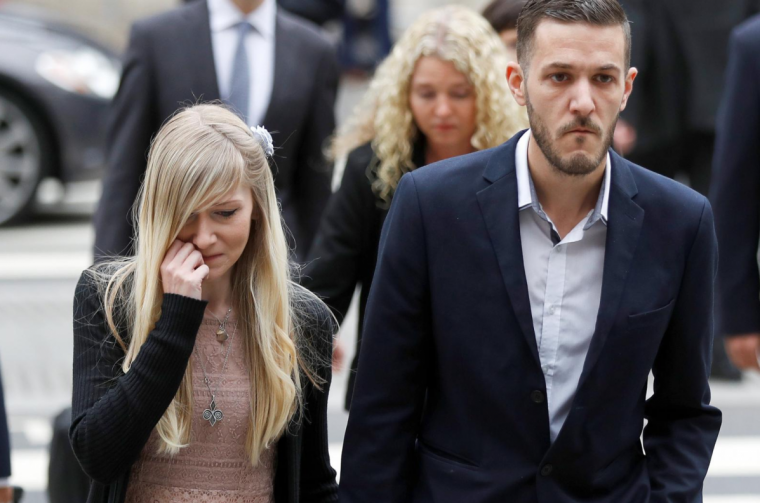As Charlie Gard's parents end legal challenge, who can we trust when it comes to life and death?
Now that the parents of the terminally ill baby Charlie Gard have ended their legal challenge to take him to the US for experimental treatment, it is time to reflect a little on this terribly sad case.
For while everyone involved, including those offering outsider commentaries, are united in grief and feels desperately sorry for Chris Gard and Connie Yates, the debate surrounding their child was always deeply polarised and – as is increasingly typical – utterly binary.
This was always ultimately a question of trust. Who gets to make decisions?

On the one hand, you had Pope Francis and Donald Trump leading the emotional reaction to Charlie's fate, hoping against hope that something could be done to prolong the baby's life by bringing him to the US or even the Vatican. They were supported by a range of Christian voices including Franklin Graham, who attacked the UK's so-called 'socialised medicine', and a pro-life US pastor with a history of publicity stunts, Patrick Mahoney, who flew from Washington to London earlier this month to act as self-appointed spokesman for Charlie's parents.
On the other hand were the medical 'experts' who are increasingly the target of suspicion in contemporary western culture, as is demonstrated by the issuing of death threats to staff at Great Ormond Street Hospital [GOSH].
It is, apparently, ever more fashionable not to trust doctors.
Yet there was something ruefully authoritative about the statement issued this week by GOSH, which itself accused an American doctor, Michio Hirano, of giving the Charlie's parents false hope.
Hirano travelled to London last week to examine Charlie for the first time and discuss the case with GOSH doctors.
In a statement read out at the High Court, Katie Gollop QC said that the hospital hoped that those, like Hirano, who 'have provided the opinions that have so sustained Charlie's parents, their hopes and thus this protracted litigation with its many consequences, will also find much upon which to reflect'.
The hospital said that Hirano had a financial interest in the Nucleoside Bypass Therapy [NBT] that he had said could help Charlie. The hospital had hoped that Hirano would be able to give Charlie's family renewed optimism, but said it had listened to his evidence to the court with 'increasing surprise and disappointment'.
The statement said: 'On 13 July he stated that not only had he not visited the hospital to examine Charlie but in addition, he had not read Charlie's contemporaneous medical records or viewed Charlie's brain imaging or read all of the second opinions about Charlie's condition (obtained from experts all of whom had taken the opportunity to examine him and consider his records) or even read the Judge's decision made on 11 April.
'Further, GOSH was concerned to hear the professor state, for the first time, whilst in the witness box, that he retains a financial interest in some of the NBT compounds he proposed prescribing for Charlie.
'Devastatingly, the information obtained since 13 July gives no cause for optimism.
'Rather, it confirms that whilst NBT may well assist others in the future, it cannot and could not have assisted Charlie.'
The respected medical expert Lord Winston, who is professor of science and society at Imperial College London, said that GOSH staff have just as much knowledge of Charlie's condition as other doctors across the world.
He told Sky News: 'I have looked up Dr Hirano and what he has written – the fact of the matter is that they have not published details which show that they clearly could have changed this boy's life and the prognosis of the disease.
'I have to say it was rather wicked to give the parents the idea that somehow had this baby been treated earlier it would have made a difference. That is not our experience with this disease.'
Meanwhile the judge in the case, Mr Justice Francis, paid tribute, like GOSH, to Charlie's parents and said that no-one could comprehend their agony and no parents could have done more.
In his powerful judgment, he said that last week's MRI scans had shown 'Charlie has no muscle at all' on parts of his body and was 'beyond help'.
The judge also decried the 'absurd notion which has appeared in recent days that Charlie has been a prisoner of the National Health Service', calling it 'the antithesis of the truth'.
He added: 'In this country children have rights independent of their parents' but added that it was, tragically, now in Charlie's best interests to die.
Charlie's parents' statement suggested that they are reconciled with the fact that their child will now die, and that they would discuss with GOSH the best way to move forward.
'We are struggling to find any comfort or peace with all this, but one thing that does give us the slightest bit of comfort, is that we truly believe that Charlie may have been too special for this cruel world,' Connie Yates said.
'We are now going to spend our last precious moments with our son Charlie, who unfortunately won't make his first birthday in just under two weeks' time, and we would ask that our privacy is respected at this very difficult time.'
While there are iniquitous, rampantly secular elements behind campaigns on issues such as assisted dying, it is important to accept that people die.
It is all, simply, terribly sad. But in the end, when it comes to the question of who to trust, the evidence is surely that Great Ormond Street Hospital was right all along.











